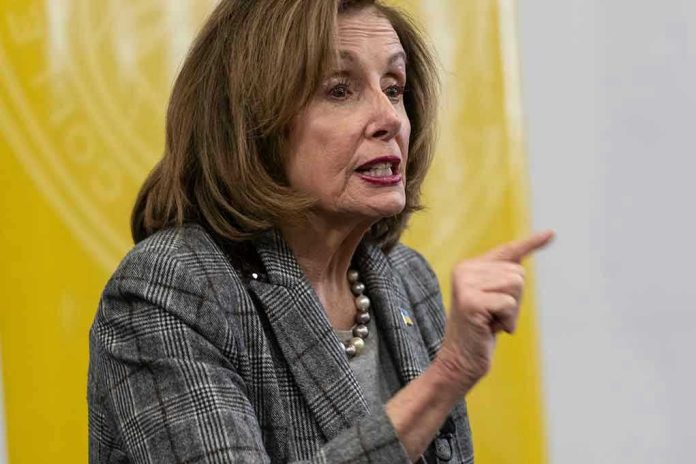
One presidential insult, broadcast live, exposed the raw nerve of American politics—leaving even seasoned analysts at a loss for words as the nation watched an era end and a new political fight begin.
Story Snapshot
- Nancy Pelosi announced her retirement after nearly four decades in Congress, triggering seismic shifts in Democratic leadership.
- Donald Trump publicly responded by calling Pelosi an “evil woman,” escalating partisan tensions to a fever pitch.
- MSNBC analysts, caught off guard, struggled to articulate the deeper significance of the moment during live coverage.
- This episode crystallizes the heightened polarization and personal animosity defining today’s political landscape.
Pelosi’s Departure: The End of an Era and the Start of a Scramble
On November 6, 2025, Nancy Pelosi declared she would not seek re-election in 2026, effectively drawing the curtain on a congressional career that redefined the art of political leadership. As the first woman to serve as Speaker of the House and a relentless force in Democratic ranks, Pelosi’s retirement forced Democrats to confront a future without their chief strategist and power broker. Her exit comes at a precarious moment, with the party still smarting from electoral setbacks and fractured by calls for generational change.
Trump's Pelosi Diss Leaves MSNBC Analyst Struggling To Find Words: 'God, We Need Like an Hour For This' https://t.co/M4dcLTP6bP
— Mediaite (@Mediaite) November 6, 2025
House Democrats, already splintered over the direction of the party, now face the daunting task of selecting new leadership while defending a legacy built over decades. Pelosi’s own video message to constituents, rich in gratitude and resolve, underscored the gravity of her decision and the stakes for her party’s future. For Republicans, her announcement represented the downfall of a long-reviled adversary—setting the stage for instant responses from their most vocal standard-bearers.
Trump’s Retort: Personal Attack as Political Theater
Donald Trump’s reaction landed with characteristic force and precision: he called Pelosi an “evil woman.” The phrase was neither calculated understatement nor mere political theater—it was a sledgehammer, wielded in real time and broadcast to millions. Such language, while not unprecedented for Trump, signaled both a refusal to grant Pelosi a dignified retirement and a desire to mobilize his own base with an unmistakable symbol of vilification. In Trump’s rhetorical universe, politics remains intensely personal and adversarial, and Pelosi’s departure was not to be marked by respect, but by renewed hostility.
The Republican base, ever attuned to Trump’s cues, responded with enthusiasm. For them, Pelosi’s exit was a victory—her tenure as Speaker had been defined by open warfare with Trump, from impeachments to viral moments like tearing up his State of the Union address. Trump’s choice of words, while condemned by many, was celebrated by others as the unfiltered voice of a movement that thrives on confrontation and grievance.
Media Grapples with the Moment’s Complexity
As the news cycle shifted into overdrive, MSNBC analysts found themselves struggling to encapsulate the gravity of the moment. One analyst, caught in the crossfire of history and bombast, admitted: “God, we need like an hour for this.” This wasn’t just a soundbite; it was a rare live acknowledgment of the sheer complexity and emotional charge of the event. The convergence of Pelosi’s historic retirement and Trump’s incendiary response demanded more than conventional punditry—it called for a reckoning with the state of American discourse itself.
Media outlets faced a dilemma: how to provide meaningful analysis when every headline seemed to fuel further division? The result was a news environment as polarized as the politics it covered. The challenge for networks like MSNBC was not just to report, but to interpret—to make sense of a moment when old rules no longer applied and the boundaries of civility had shifted yet again.
Polarization, Legacy, and the Road Ahead
Pelosi’s departure and Trump’s response revealed more than just a clash of personalities—they exposed the deep grooves of polarization now etched into America’s political landscape. For Democrats, the loss of Pelosi is more than symbolic; it is a logistical and strategic challenge that will shape the party’s fortunes for years. For Republicans, Trump’s attack reinforced a style of politics that prizes loyalty and confrontation over compromise or decorum.
The episode also raised uncomfortable questions about the future of American political discourse. As personal attacks become normalized and media outlets struggle to keep pace, the risk grows that substance will be lost amid spectacle. Some experts see this as an opportunity for renewal, especially within the Democratic Party, while others warn of a further erosion of civility and trust. What is certain: Pelosi’s retirement did not bring closure, but instead opened a new chapter in the nation’s ongoing struggle to define the boundaries of public life—and the tone of its most consequential conversations.
Sources:
Trump calls Nancy Pelosi ‘evil woman’ after she announces retirement

